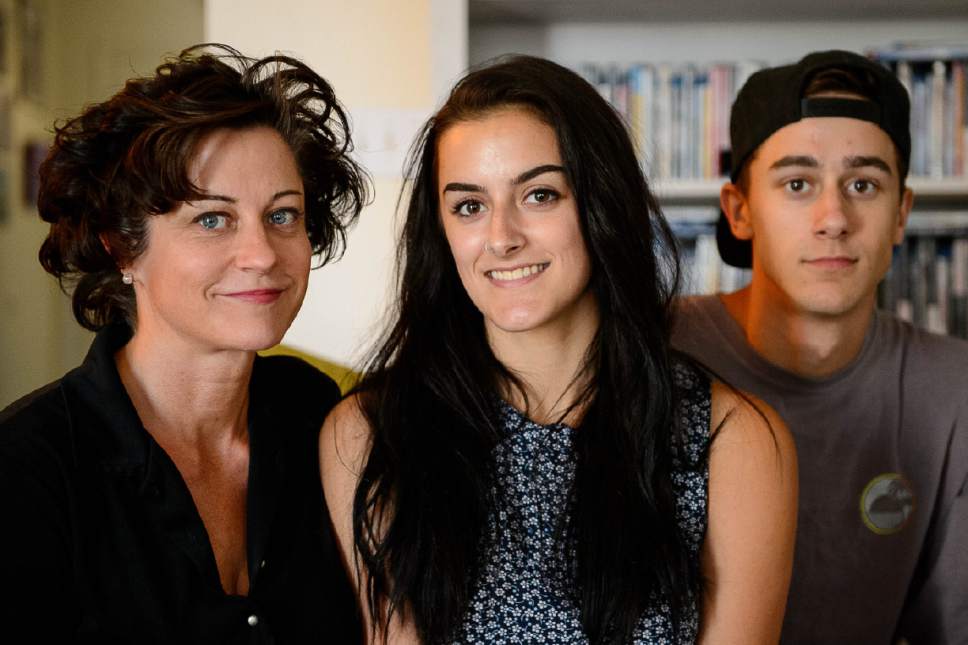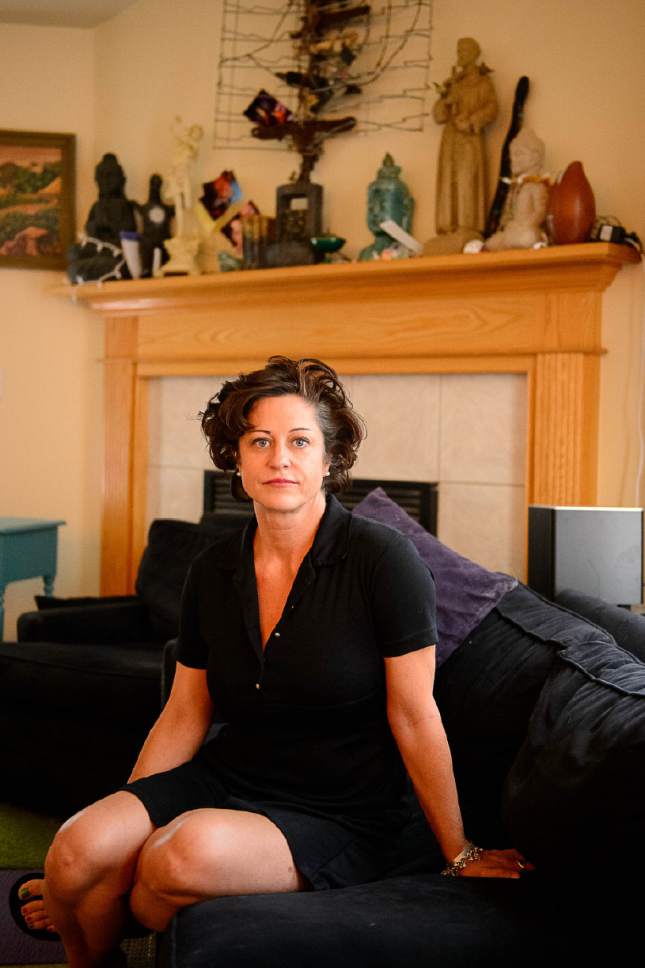This is an archived article that was published on sltrib.com in 2017, and information in the article may be outdated. It is provided only for personal research purposes and may not be reprinted.
Susan Stetich is 45, energetic and commands attention when she enters a room. The North Salt Lake mother of three teenagers runs her kids all over town to sporting events, movies and hangouts.
No one would ever know she was diagnosed with multiple sclerosis in 2003, and she plans to stay active as long as possible.
But if the Senate Republicans' health care bill passes, she said, that diagnosis becomes a scarlet letter on her chest. Multiple sclerosis, or MS, is a debilitating disease in which the body's immune system attacks and eats away at the protective sheath that covers nerve cells.
"I'm just a normal person who acts normal and wants her kids to go to college. That's what makes me mad," Stetich said. "I'm a mother who has MS, and when something affects me, [my children] have less hope and less chance for a future."
Stetich is one of millions of Americans who find themselves in a kind of limbo. President Barack Obama's Affordable Care Act (ACA) made it possible for them to get health insurance, but that could be taken away under the Senate's plan, known as the Better Care Reconciliation Act.
A recent study by the Urban Institute, a left-leaning Washington, D.C-based economic and social policy think tank, found that 586,000 nonelderly Utahns — or 72 percent more people — would be uninsured in 2022 under the Senate plan compared to the ACA. Under the current law, the institute estimates that 341,000 people would be uninsured under the ACA in 2022.
This percentage increase puts Utah at No. 31 for the most detrimental effects of the Senate measure on uninsured rates, with the worst being West Virginia at 309 percent higher, the study estimates.
Nationwide, the uninsured rate, on average, would be 80 percent higher for the nonelderly U.S. population under the Senate plan, with 24.7 million more without insurance in 2022, according to the study.
The Senate proposal would limit the number of tax credits that help people buy insurance on the marketplace and eliminate the ACA's individual mandate for insurance. It also would roll back Medicaid expansion and make cuts to the existing program for low-income and disabled residents, while lowering taxes for the wealthy.
Supporters of the Senate plan say the ACA is deeply flawed, and Americans need a health care law that will lower costs.
Additionally, the Senate plan would require insurers to offer coverage for people with pre-existing conditions, but states could waive essential health benefits coverage — including mental health, prescription drugs and maternity care — and bans on lifetime and annual limits on coverage.
Those two changes alone could increase out-of-pocket expenses by thousands of dollars, especially for people with cancer or diseases, such as MS, that require expensive drugs, according to the Congressional Budget Office.
The medication Stetich uses to keep her MS under control costs $50,000 a year. Without it, she could have an attack at anytime. In an instant, she could go blind and lose her ability to walk or speak.
But Stetich said she'd forgo the meds and face constant uncertainty before sacrificing her teenagers' needs.
"I'm not going to displace my children for ... the GOP," she said. "I'll put my kids before my health."
These provisions in the Senate bill also have Abigail Mower, 19, nervous. Breast cancer runs in her family — her mother died of the disease when Mower was 6 years old.
If she were to be tested for the breast-cancer gene, she said, it could be considered a pre-existing condition and her insurance coverage could be impacted.
If the Senate measure passes, Mower said she'll find herself in a Catch-22. Finding out she has the gene will allow her to take preventive steps to detect any cancer before it spreads. But discovering the gene could mean eliminating her health care coverage, leaving her without access to preventive care anyway.
"I'm only 19," Mower said. "I shouldn't have to be thinking about this right now."
The Senate bill now is the subject of intense negotiation among Republicans, who asked the Congressional Budget Office in late June to analyze the measure in light of several proposed amendments.
One of those amendments, put forward by Utah Sen. Mike Lee and Texas Sen. Ted Cruz, would allow health insurers to sell plans that do not meet standards mandated by the ACA, so long as they sold at least one plan that complies with ACA rules.
Jason Stevenson, education and communications director for the Utah Health Policy Project, said the debate in Washington has brought many phone calls to his office, from people fearful that they'll lose their benefits or subsidies due to increased premium prices or pre-existing conditions.
"People are worried about the overall design of the insurance plans because they realize that it could affect their overall insurance," he added.
It's unclear when a vote on the Senate bill will take place, but Utahns in recent weeks have protested, staged sit-ins and delivered petitions at the Wallace F. Bennett Federal Building in downtown Salt Lake City, hoping Republican Sens. Lee and Orrin Hatch will hear their pleas to vote against the measure.
Conn Carroll, Lee's spokesman, previously said that the stories shared during a meeting with staffers would be passed along to Lee. "We try to be as open and transparent as possible and listen to people, especially dissenters, to hear their side of the story," Carroll said.
After a protest last month, Hatch spokesman Matt Whitlock pointed to Hatch's leading role in passage of the Children's Health Insurance Program for low-income youngsters, along with his backing of other medical initiatives.
"Senator Hatch is focused on working in that same spirit to address the undeniable shortcomings of Obamacare," the statement said, "and to finally bring Utahns and all Americans the patient-centered and affordable care they deserve."
Marilyn Getts has been among the protesters, aiming to convey what the ACA has meant for her family.
Her daughter, Rachel, struggled for years to get insurance because her job didn't offer it. But three years ago, she was able to get affordable coverage under the ACA. Getts now sleeps more peacefully.
Before the ACA, "I figured I'd sell my house if anything happened to her," Getts said last week.
The mother could again be choosing between her home and her daughter's health — if the Senate plan is approved.
"This is not the America I dreamed of," Getts said at one of the Salt Lake City protests last week. "I find it unconscionable that [Hatch] would think somehow this health care bill is actually good for the state."
Twitter @alexdstuckey Top 10 U.S. states likely to see the highest increases in uninsured residents in 2022 under of the Better Care Reconciliation Act compared to the current law:
1. West Virginia: 309%
2. Kentucky: 231%
3. Washington, D.C.: 208%
4. Arkansas: 200%
5. Pennsylvania: 197%
6. Michigan: 196%
7. Rhode Island: 196%
8. New Hampshire: 195%
9. Connecticut: 187%
10. Ohio: 184%
...
31. Utah: 72%
Source: Urban Institute







